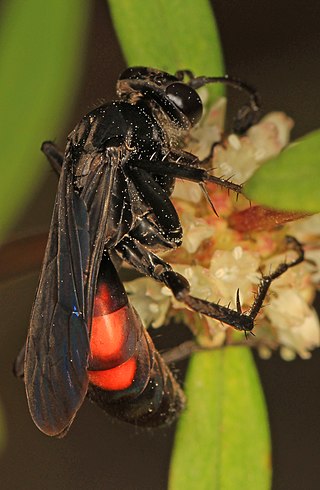
Cleora is an unincorporated community and census-designated place (CDP) in Delaware County, Oklahoma, United States, along State Highway 85. The population was 1,463 at the 2010 census, up from the figure of 1,113 recorded in 2000. The Cleora Post Office existed from November 28, 1900, until October 15, 1954. Cleora was established in District 2 of the old Indian Territory. It was named for Cleora Ann Lunday, sister of the postmaster, Ed Lunday.

Cleora cinctaria, the ringed carpet, is a moth of the family Geometridae. The species was first described by Michael Denis and Ignaz Schiffermüller in 1775. It is found from Europe to southern Siberia, Turkey, the Caucasus, central Asia and Mongolia. It is also found in Japan.

Cleora repetita is a species of moth of the family Geometridae first described by Arthur Gardiner Butler in 1882. It is found from Sundaland to Australia and the Solomon Islands.

Anoplius is a genus of spider wasps in the family Pompilidae, called the blue-black spider wasps.

Anoplius viaticus, commonly known as the black-banded spider wasp, is a species of spider wasp. These wasps are known as spider wasps because the females capture spiders to provide their offspring with food. The paralysed spider is cached in a burrow, the wasp lays an egg on it, and when this hatches, the developing wasp larva consumes the spider. This species is found in sandy heathland across most of Europe.

Anoplius americanus is a species of blue-black spider wasp which is widely distributed in the New World.

Cleora leucophaea is a species of moth in the family Geometridae. It is found in East Asia.

Cleora scriptaria, the kawakawa looper moth, is a moth in the family Geometridae endemic to New Zealand.

Cleora alienaria is a moth of the family Geometridae first described by Francis Walker in 1860. It is found in Sri Lanka, the Indian subregion to the Andaman Islands, Thailand, Sundaland, Taiwan, and Lesser Sundas as far east as Timor and Christmas Island.
Anoplius virginiensis is a species of spider wasp in the family Pompilidae.
Anoplius illinoensis is a species of spider wasp in the family Pompilidae.
Anoplius subcylindricus is a species of spider wasp in the family Pompilidae.

Anoplius apiculatus is a species of spider wasp in the family Pompilidae.

Anoplius aethiops is a species of spider wasp in the family Pompilidae. It primarily lives in overgrown fields with fine-grained soil. It provisions its young with paralyzed Lycosidae spiders, especially those of the genus Hogna.

Anoplius atrox is a species of spider wasp in the family Pompilidae.
Anoplius carolinus is a species of spider wasp in the family Pompilidae.

Anoplius semirufus is a species of spider wasp in the family Pompilidae.
Anoplius ithaca is a species of spider wasp in the family Pompilidae.

Anoplius depressipes is a species of spider wasp in the family Pompilidae. It is a known predator of fishing spiders from the genus Dolomedes, and the wasp is highly adept at walking on the surface of water.

Ceropales bipunctata, the Two-Speckled Cuckoo Spider Wasp, is a species of diurnal, kleptoparasitic spider wasp in the family Pompilidae. It is an obligate kleptoparasite, meaning that it must rely on the captured provisions of other spider wasps and cannot capture its own. It is found on the Atlantic Coast of North America, north to New Brunswick, Canada. It feeds on nectar primarily from goldenrods, and also other common nectaring plants. It is known to lay an egg on the prey of other pompilids, including the two species Anoplius cleora and Anoplius aethiops. Eggs are laid in the book lung of the spider. These wasps also sometimes lay an egg on prey from spider-hunting wasps in the family Sphecidae.













